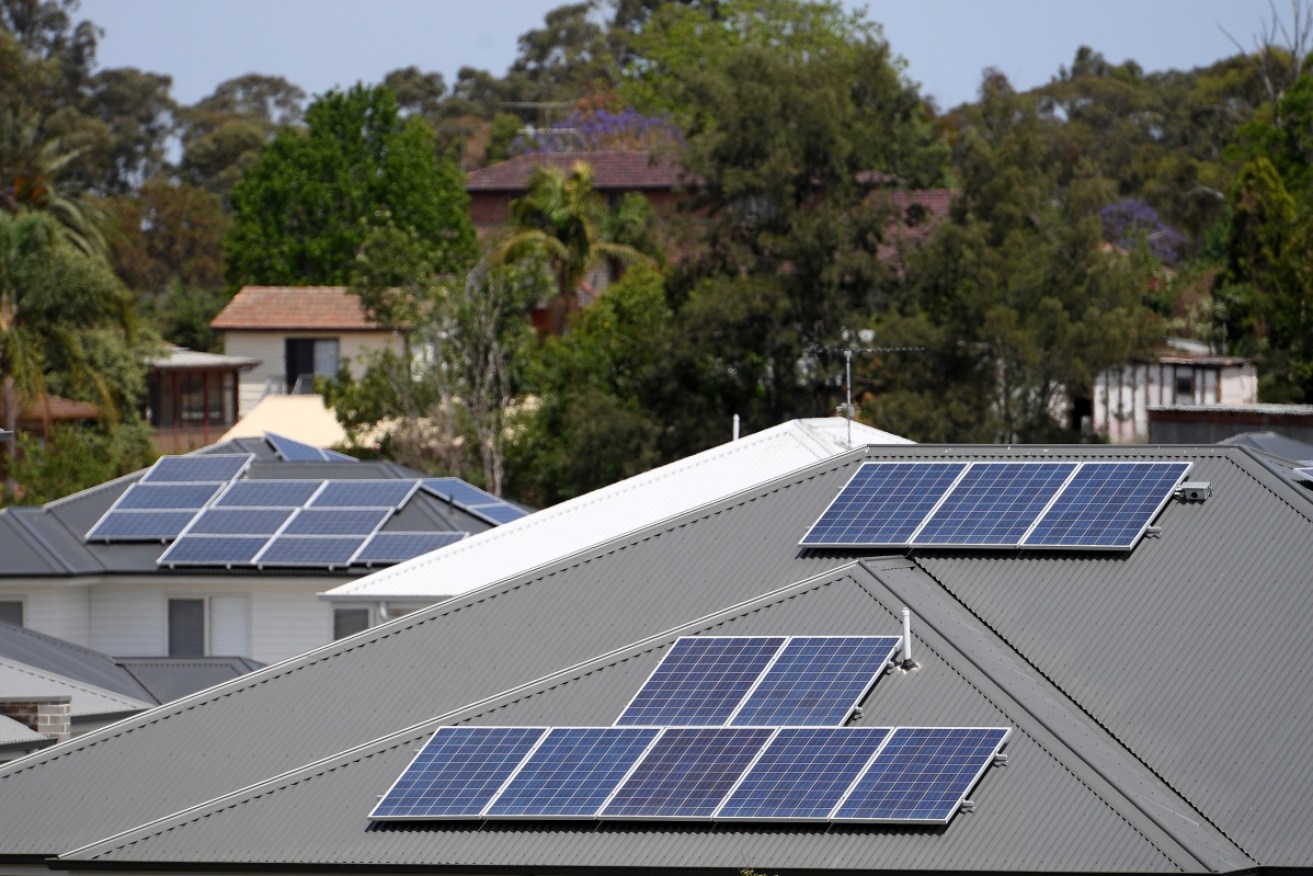Record year for rooftop solar as households seek to cut costs


2017 was a record year for rooftop solar in Australia. Photo: AAP
Australian homeowners are turning to renewable energy to cut power costs, with rooftop solar installations at record levels.
Total household solar energy storage more than doubled in 2017, according to a report by the Clean Energy Council (CEC) released on Wednesday.
It was a record year for rooftop solar power in Australia, with 1.1 gigawatts of new generating capacity created via 20,789 new rooftop solar units, up from 6750 the year before, the report found.
Solar power’s success is due to households embracing the renewable technology as a means to keep energy costs down, Clean Energy Council (CEC) chief executive Kane Thornton said.
“Solar power has been extremely successful in Australia because not only do we have some of the strongest sunshine in the world, but because more and more families in the outer suburbs and regional parts of the country are actively looking for ways to turn down the heat on their power bills,” Mr Thornton said.
“Ultimately it boils down to rising energy bills and the declining cost of solar power systems.”
The charge is being led by low and middle-income households looking to cut energy costs, with “well-heeled” areas lagging behind, the CEC said.
“The people installing solar are those who are the most sensitive to the cost of power – families who have to pay school and sporting club fees, and retirees who are looking to reduce the impact of ongoing bills,” Mr Thornton said.
“It is certainly not as popular in well-heeled inner-city suburbs where the cost of energy isn’t such a big concern.”
Power prices are expected to fall more than six per cent on average over the next two years as more wind and solar power comes online, the CEC said.
Solar energy is an increasingly popular form of power around the world, with California this month becoming the first US state to mandate rooftop solar systems in all new homes from 2020, in a bid to halve household energy use.
Batteries: Next big renewable for Aussie homes
Then South Australian premier Jay Weatherill made headlines last year when he cut a deal with billionaire Tesla CEO Elon Musk to build the world’s largest lithium ion battery—the Hornsdale Power Reserve in mid-north SA.
Australian software billionaire Mike Cannon-Brookes, who helped facilitate the deal, said on Twitter that the battery was already paying off for South Australians.
“Consumers (taxpayers) saved $35 [million] in the first 4 months…Wave a lump of coal at that!” the Atlassian co-founder said.
⚡️ First they mock you, then they fight you, then you win.
Let me be clear – the SA govt invested ~$50m. Consumers (taxpayers) saved $35m in the first 4 months. At that rate, $105m in year 1… of a 20 year+ infrastructure asset.
Wave a lump of coal at that! 🔋 https://t.co/zjAmpniSuw
— Mike Cannon-Brookes 👨🏼💻🧢🇦🇺 (@mcannonbrookes) May 11, 2018
The South Australian government plans to slash energy bills further by installing 50,000 battery and solar power systems in households free of charge.
Growing numbers of households around the country are expected to jump on the battery bandwagon in the coming years as the technology becomes more affordable, the CEC said.
“Batteries will be the next big technology to take off at the household level, as the falling cost of the technology helps to make it more affordable for everyday mums and dads,” Mr Thornton said.
Other cost-effective renewable technologies include solar hot water technology and heat pumps, which are “often overlooked” in favour of rooftop solar power, but are “extremely efficient” and work very well, Mr Thornton said.
“Energy efficient appliances and LED lighting can also make a big difference to household power bills,” he said.
Homeowners aren’t alone when it comes to renewable energy uptake, either, with businesses of all sizes realising that renewable energy makes commercial sense, Mr Thornton said.
“The big shift in the last couple of years has been towards commercial installations, as businesses of all sizes crunch the numbers and work out that solar power can be an insurance policy against the often volatile price of energy,” he said.








